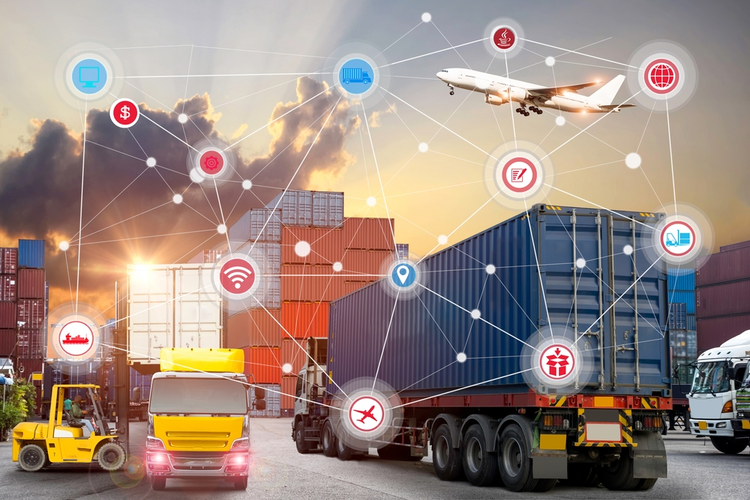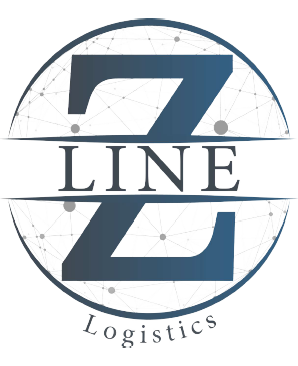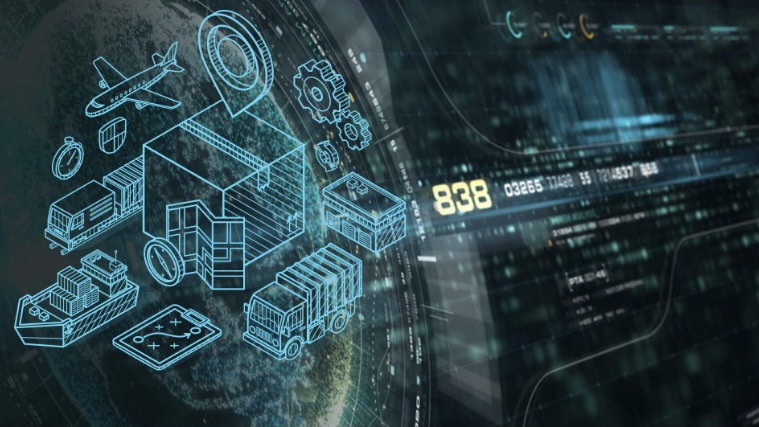Table of Contents
Blockchain in Logistics And Supply Chain is confronted by diverse challenges in the current fast-paced global economy; they include inefficiencies and errors and issues of transparency and trust.
In this regard, blockchain in logistics and supply chain appears as a breakthrough technology capable of transforming how goods are carried, traced, and managed through the supply chain.
Blockchain, also referred to as the backbone for digital currencies such as Bitcoin, is a distributed, unalterable list of records which are stored on multiple computers and processed in a secure and transparent manner. It is distributed in nature which enables no one actor to own the data spreading trust and obviates the need for mediators.
The potential benefits of blockchain in logistics and supply chain are huge as it brings improved transparency, visibility, and security all through the product lifecycle from production to delivery.
Applying blockchain companies can optimize processes, cut costs, and reduce risks therefore they offer better products and services to the customers.
This blog will investigate the power of blockchain technology transformation in logistics and supply chain management.
We will study its main elements: smart contracts and decentralized consensus mechanisms, see live applications and hear the stories of successful launch projects.
Starting from the improvement of inventory management to tackling the issue of counterfeits, blockchain is ready to transform the industry revolutionarily by ushering in a new dawn of efficiency, accountability and trust.
Come with us as we discover the brave new frontier of blockchain in logistic and supply chain management.
What Is Blockchain in Logistics And Supply Chain?

Blockchain in logistics and supply chain refers to the deployment of blockchain technology in the administration and optimization of processes in the path of goods from supply chain to consumers.
Blockchain is the secure and unalterable recording of transactions in a distributed and decentralized ledger.
In terms of what is a blockchain in logistics and supply chain, blockchain is a file of every trace of goods’ positions, ensuring complete visibility and traceability all through.
Blockchain in logistics and supply chain technology offers several key features and benefits for logistics and supply chain management.
1. Transparency: The blockchain creates a clear and unchangeable ledger that records all transactions and products movement allowing stakeholders to track the journey of products which starts from their origin to the destination.
2. Traceability: By recording every transaction on the blockchain the supply chain participants control the provenance of products, verify they are in compliance with the regulations and spot inefficiencies and issues in the supply chain.
3. Security: Blockchain’s decentralized and immutable features ensures security and eliminates the possibility of fraud as data is resistant to alteration and unauthorized manipulation.
4. Efficiency: Blockchain technology streamlines document workflows, automates transactions, and reduces paperwork thus driving faster and more effective supply chains.
5. Collaboration: The blockchain technology helps create trust and cooperation between supply chain participants in terms of transfer of information and conducting transactions through its provision of a safe and transparent environment.
In essence, Blockchain in Logistics And Supply Chain holds the promise to transform the logistics and supply chain industry by enhancing transparency, traceability, security and efficiency across all aspects of supply chain operation.
Read more: What is cold chain management?
What Is The Application of Blockchain in Logistics and Supply Chain?

The blockchain Blockchain in Logistics And Supply Chain gives a number of the highly `compelling solutions` in the domain of logistics and supply chain management, completely changing them.
Here are some key applications:
Supply Chain Transparency and Traceability
Blockchain offers an end-to-end visibility guarantee and traceability through the whole supply chain of tracking every transaction and movement of goods by recording them in a transparent and immutable ledger.
This transparency guarantees visibility of inefficiencies, source tracing and assurance that product is in accordance with regulations and standards.
Take for instance, in the food sector, blockchain can track the path of the products from farm to table therefore improving safety and quality of food.
Streamlined Documentation and Digitalization
Established logistics practices include a lot of paperwork and manual documentation which result in delays, mistakes and ineffectiveness.
Blockchain-oriented platforms are applications of digital technology that facilitate documentation processes such as bills of lading, customs documents, and proof of delivery which results in decreased information and paper usage, faster transactions and higher accuracy.
Smart Contracts for Automated Transactions
Smart contracts are self-executing contracts with predefined rules encoded on the blockchain.
In logistics, smart contracts regulate and make easier the flow of transactions which include payments, delivery confirmation, and contract fulfillment.
For instance, smart contracts can automatically pay out once certain conditions, for example delivery confirmation or quality inspection, are fulfilled, thus there are no intermediaries needed and the transaction costs are reduced.
Anti-counterfeiting and Product Authentication
Forged products are a problem for supply chains which results in financial losses and reputation damage to companies.
Blockchain in logistics and supply chain offers a secure, immutable environment that can validate the provenance of products based on records of their production, distribution, and ownership history.
Being identified through a unique blockchain-based identifier scanned by consumers or stakeholders, authenticity of products can be verified and quality standards can be met.
Inventory Management and Asset Tracking
Blockchain technology facilitates the real-time tracking and management of inventory and assets all through the supply chain.
Tracking placed products on the blockchain enables companies to enhance inventory accuracy, minimize stock levels, and eliminate the risk of loss or theft.
Moreover, the blockchain-based asset tracking systems can also boost the supply chain efficiency by offering real-time monitoring of assets, e.g. vehicles, containers and equipment.
Supply Chain Financing and Trade Finance
Supply chain financing is supported by blockchain-based platforms which provide transparent and auditable records of transactions, invoices, and payment histories.
This transparency also reduces the chance of fraud and makes more economical and secure financial arrangements, such as invoice financing and supply chain financing.
Blockchain digitalizes trade finance processes thus expedites transactions, cuts processing hours and as well reduces costs for companies involved in international trade.
In general, blockchain technology provides a broad spectrum of applications for logistics and supply chain management leading to higher traceability, performance and safety throughout the whole supply chain.
Through utilizing blockchain, companies can transform operations, cut down costs and design robust and sustainable supply chains for tomorrow.

FAQs
Can blockchain be used in supply chain?
Yes, blockchain can be applied in the supply chain management to disrupt the way goods are traced, managed and verified across the entire supply chain lifecycle.
The blockchain technology provides secure, transparent, and immutable ledger that captures in real time transactions and goods movements, thus improving transparency, traceability and trust of participants.
That’s how to use blockchain in logistics!
How blockchain will transform the supply chain and logistics industry?
With the development of blockchain, the supply chain and logistics industry can bring great efficiency to the industry.
Through end-to-end visibility and traceability, blockchain increases transparency and accountability in supply chain operations which reduces the risk of fraud, counterfeiting and errors.
Moreover, blockchain simplifies documentation procedures, automates transactions, and increases efficiency resulting in lower costs and quicker delivery.
To sum up, blockchain technology is expected to transform the supply chain management via efficiency in operations, better security and engagement of all the stakeholders.
All in all, blockchain in logistics and supply chain is a game-changer, providing unprecedented transparency, security, and efficiency.
Blockchain comes in with the ability of transforming the way goods are tracked, managed, and financed, hence leading to streamlined operations, reduced costs and risk mitigation across the whole supply chain.
Along the way as businesses evolve by applying and working with blockchain technologies more, the logistics industry would bring out a lot of new advances and revolution. In the meantime, even better discoveries and improvements will appear.




